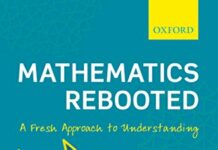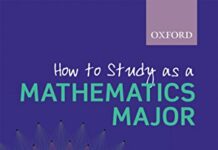
Ebook Info
- Published: 2014
- Number of pages: 274 pages
- Format: PDF
- File Size: 1.18 MB
- Authors: Lara Alcock
Description
Analysis (sometimes called Real Analysis or Advanced Calculus) is a core subject in most undergraduate mathematics degrees. It is elegant, clever and rewarding to learn, but it is hard. Even the best students find it challenging, and those who are unprepared often find it incomprehensible at first. This book aims to ensure that no student need be unprepared. It is not like other Analysis books. It is not a textbook containing standard content. Rather, it isdesigned to be read before arriving at university and/or before starting an Analysis course, or as a companion text once a course is begun. It provides a friendly and readable introduction to the subject by building on the student’s existing understanding of six key topics: sequences, series, continuity,differentiability, integrability and the real numbers. It explains how mathematicians develop and use sophisticated formal versions of these ideas, and provides a detailed introduction to the central definitions, theorems and proofs, pointing out typical areas of difficulty and confusion and explaining how to overcome these.The book also provides study advice focused on the skills that students need if they are to build on this introduction and learn successfully in their own Analysis courses: it explains how to understand definitions, theorems and proofs by relating them to examples and diagrams, how to think productively about proofs, and how theories are taught in lectures and books on advanced mathematics. It also offers practical guidance on strategies for effective study planning. The advice throughout isresearch based and is presented in an engaging style that will be accessible to students who are new to advanced abstract mathematics.
User’s Reviews
Reviews from Amazon users which were colected at the time this book was published on the website:
⭐I went through a Fundamental Concepts course in college doing analysis but never really understanding what the field was about. This book has helped me a lot. Alcock has taught many college courses (twenty times, I think she wrote) and thus has a good sense of when students go astray. She also has excellent tips from her companion book, “How to Study as a Mathematics Major,” which I thought was very useful about the study habits that make math different from other subjects.I think “professional” college-level teachers might find this book not to be rigorous enough, but such a judgment would be premature and probably not helpful. Students need to start where they can be comfortable, and Alcock’s book is quite good.
⭐I bought this after I made a D in Real Analysis, in preparation to retake the course. It is EXTREMELY helpful in switching gears from computational thinking to more abstract proof writing!
⭐This is just a great little book. It makes no assumptions that the student transitioning from a Calculus class has had every notion regarding functions, series, etc, rigorously explored and reduced to knowledge. The author anticipates the usual hang-ups in perceptual and mathematical knowledge and explicitly addresses them. Finally, she clearly understands that, for students moving into Analysis, this is the first real “stress test” to their system of logical reasoning. What’s not to like about that? To those who consider it over-simplified or less-rigorous, re-read the introduction. It’s a prequel to the course.
⭐A nice book for a student to see a higher level approach, to see why and how things are done. It also serves as a nice refresher for those who have been away from Math (like myself) for a while. The explanations are simple enough that if you have taken some advanced Math courses before, it is very nice to have. If you are one trying to learn theories, probably not the book you’d start with, as I think you’ll be doing yourself injustice by not getting more in-depth explanations.
⭐Such an enjoyable book, I truly could not put this book down until I read every word. Her writing style with clear explanations, good examples and clever diagramming, renders with feared topic as quite easy and actually enjoyable. If you are struggling with Real Analysis, I believer you will benefit greatly from this work. Thank you Lara.
⭐Lara is sincere: this does not want to be another treatise on Analysis. Instead, she wants to teach you how to learn Analysis and advices that you must keep in mind. The purpose of this little book is to teach you the subtleties of Analysis and how professors/lecturers think.
⭐I loved this book. It explains the topics of analysis in an informal way. It walks you through the proofs step by step. It doesn’t go in depth, but is a great supplement to have while taking an undergraduate analysis course.
⭐Splendid book!, it’s a pitty that I had not had this book in my hands when I was student. I would save a lot of night of nightmare with Math Analysis, Nobody explain this subjet with so much patiente, rigor and sweetness as Lara Alcock do, I really love her!, a pleasure for the mind.
⭐An excellent, clear introduction to a fascinating subject that is often unnecessarily obfuscated.Typically, books on analysis, even at the supposedly introductory level, seem to be written with the assumption that by some magical means you are already familiar with the ideas, definitions and main theorems of the subject despite not having studied it yet. It’s part of a more general trend which blights a lot of mathematical writing – a sort of extreme insistence on foregrounding logical development at the expense of pedagogy.Happily, Alcock’s book is an exception to that ignoble tradition. Without sacrificing the logical development, she presents – and, crucially, motivates – the basic ideas of real analysis in a very accessible and readable way. She also outlines a number of useful tricks and learning techniques relevant to the subject.Necessarily, the treatment is fairly elementary and only covers a fairly small amount of ground. But as someone who has studied analysis at both undergraduate and postgraduate levels, I enjoyed it and found that it helped me think again about my approach to some of these basic ideas. I wish I had read it at the beginning of my studies, it would have made a lot of things clearer more quickly.Because of the subject matter, it’s unlikely to appeal to a general readership. But for students beginning their studies in pure mathematics, and more a more general mathematically curious audience who want to refresh their understanding of basic real analysis or get a good idea of what the subject is about, this is an excellent read.
⭐It’s not often I stop by the feedback sections to leave comments on books, but I felt compelled to here, as this is such a marvellous analysis book. Many advanced mathematics books contain a lot of clutter and bombard you with symbols and abbreviations. Not Lara Alcock’s ‘How to Think About Analysis’. It explains complicated parts of analysis with just the right mixture of words and mathematics, which make it an easy and enjoyable read, despite the fact it’s about analysis. Not only that, the explanations come with fantastic graphs making the words and mathematical explanations even easier to understand. I just got the book yesterday, and today I’m already 70 pages in, and I’m understanding analysis like never before. As things stand, it will go down in my mind of one of the best mathematics books I’ve ever read. I have no doubt that it will set the stage for greater things to come in my maths career. A great investment! Fantastic introduction to analysis! 5 stars!
⭐I’m not a mathematician, but I love maths and I like reading maths books and books about maths. Before I got this book I knew very little about analysis. Now I know a bit about analysis and, perhaps more importantly, I know what it is all about. If you are coming to this subject (like me) as a complete novice, it’s hard going. But, at least, the author doesn’t pretend it isn’t and she takes a realistic approach throughout. I doubt whether there is a book on analysis that is intuitively easy to read and understand. Note that the intended readership is students who are embarking on a degree in maths (which I’m not), but if you just want to know something about the logic of analysis this is a good place to start.
⭐The second book to ‘How To Study for a Mathematics Degree’, and the Arthur has done another fantastic job. I had my fears about starting the Analysis topics within my Mathematics Degree, however this book has helped ease me into the it. The book focuses more on the topic of Analysis by giving tips on how to better understand the information compared to her previous book which included how to study at a University.Keep this book with you while doing your Analysis topics during your degree it has proven invaluable for myself and I hope is does for you to.
⭐Really good book to understand how to study analysis. This is not a book about all theorems and definitions and exercises needed to take a course, but will help you to understand other books and your lecturer or professor. And most of all to understand the subject of analysis!
Keywords
Free Download How to Think About Analysis in PDF format
How to Think About Analysis PDF Free Download
Download How to Think About Analysis 2014 PDF Free
How to Think About Analysis 2014 PDF Free Download
Download How to Think About Analysis PDF
Free Download Ebook How to Think About Analysis

